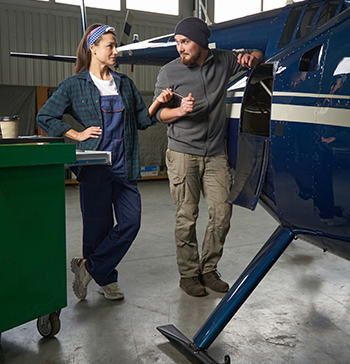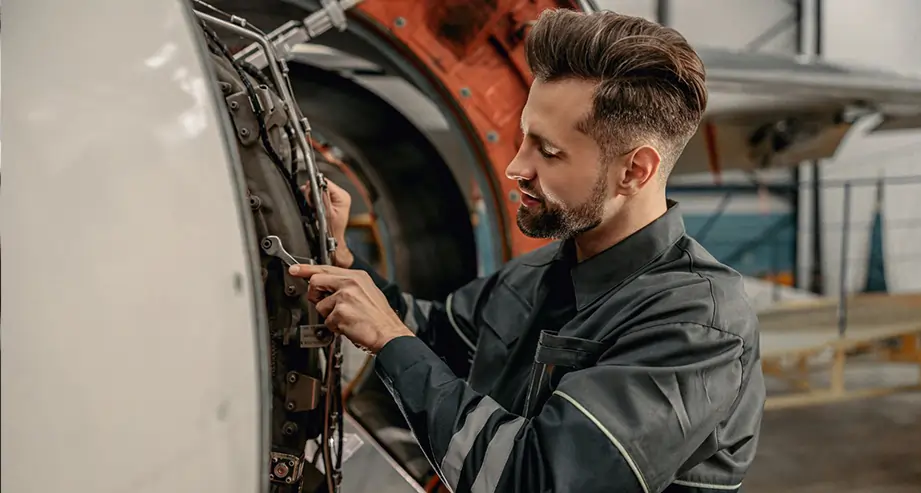The field of aviation is vast and multifaceted, offering numerous opportunities for those who wish to pursue a career in this dynamic industry. At Aero Wave Aviation and Maintenance School, we often encounter students faced with a crucial decision: whether to specialise in mechanical or avionics. Both disciplines are integral to the safe and efficient operation of aircraft, but they offer distinct career paths and skill sets. Understanding the key differences, career opportunities, and future prospects in each can help aspiring aviation technicians make an informed choice.
This comprehensive guide aims to explore the two specialties, comparing them across various dimensions such as skills, career growth, salary expectations, daily work environments, industry demand, and future outlook.
Understanding Mechanical vs. Avionics in Aviation
Mechanical Systems in Aviation
The mechanical aspect of aviation focuses on the aircraft’s physical components and systems, excluding the electrical and electronic systems that avionics technicians handle. Mechanical aviation technicians, also known as aircraft mechanics, are responsible for maintaining and repairing the structural, hydraulic, pneumatic, and propulsion systems of an aircraft. Their expertise extends to:
- Airframe systems: This includes the fuselage, wings, and undercarriage (landing gear). Mechanics ensure that the aircraft’s structural integrity is maintained, conducting routine inspections, repairs, and replacements of worn or damaged parts.
- Powerplant systems: Aircraft engines, whether jet turbines or reciprocating engines, require constant attention. Aircraft mechanics inspect, repair, and maintain engines, ensuring they operate efficiently and safely.
- Hydraulic and pneumatic systems: These systems power critical components such as the aircraft’s landing gear, flaps, and brakes. Mechanical technicians must ensure these systems are functioning correctly.
- Flight control systems: While some aspects of flight control involve avionics (for example, the fly-by-wire system), many mechanical components such as control rods, cables, and surfaces require the attention of an aircraft mechanic.
Want to find out more about our Aviation Mechanic Courses?
Avionics, short for aviation electronics, is a specialised field that focuses on the electrical and electronic systems of an aircraft. Avionics technicians are responsible for the maintenance, repair, and installation of systems that manage communication, navigation, weather radar, flight control, and the autopilot. Key areas in avionics include:
- Communication systems: Aircraft rely on radio, satellite, and other forms of communication to ensure smooth operations between pilots, air traffic controllers, and ground stations.
- Navigation systems: Avionics technicians work on GPS, VOR (VHF Omnidirectional Range), and ILS (Instrument Landing Systems) to ensure that aircraft can navigate safely.
- Autopilot and flight control systems: Avionics systems help pilots control the aircraft, reducing their workload and enhancing flight safety.
- Electrical systems: Avionics technicians are responsible for the electrical wiring, circuit boards, and other electronic components that provide power and functionality to various systems onboard.
- In-flight entertainment systems: In the case of commercial airlines, avionics technicians may also be responsible for maintaining passenger entertainment and communication systems.
Comparing Mechanical and Avionics Roles
Both mechanical and avionics disciplines are critical to aviation safety and efficiency, but they diverge in terms of the skills required, the nature of the work, and career trajectories.
Skills and Education Requirements
- Mechanical Technicians: A career in mechanical aviation maintenance demands strong mechanical aptitude and hands-on problem-solving skills. Mechanics must be adept at working with tools and physical components, such as engines and airframes. They should be comfortable reading technical manuals and blueprints. Most mechanical technicians begin their careers with a foundation in general mechanics, often gaining experience through military service, apprenticeships, or certification programs. Formal training in aircraft systems, including hydraulics, pneumatics, and flight controls, is essential.
- Avionics Technicians: A career in avionics requires a solid understanding of electronics, electrical engineering, and computer systems. Avionics technicians must be familiar with electronic schematics and troubleshooting tools like multimeters and oscilloscopes. Since avionics systems are highly complex and computerised, these technicians need to have a strong background in digital systems, programming, and network theory. Educational requirements usually include specialised courses in electronics, avionics systems, and telecommunications.
Both careers require certification from aviation authorities such as the Federal Aviation Administration (FAA) or the European Union Aviation Safety Agency (EASA). For avionics technicians, additional certifications in electronics may be required, depending on the specific systems they work on.
Daily Work Environment and Responsibilities
- Mechanical Technicians: The work of a mechanical technician is often physical, requiring technicians to climb ladders, lift heavy components, and work in tight spaces. Routine tasks include inspecting aircraft for wear and damage, replacing worn parts, and performing scheduled maintenance. Mechanical technicians often work outdoors on the tarmac, in hangars, or at maintenance facilities, and their job can be physically demanding.
In terms of daily activities, mechanical technicians might spend their day troubleshooting engine problems, replacing landing gear, or performing routine inspections on an aircraft’s fuselage. Given the nature of aircraft operation, mechanics often work irregular hours, including nights, weekends, and holidays, particularly in commercial aviation where aircraft turnaround times are short.
- Avionics Technicians: The daily routine of an avionics technician is less physically demanding but more intellectually complex. Much of their work is performed in climate-controlled environments, either in workshops or hangars. While they may occasionally work on the tarmac, most avionics work is conducted inside the cockpit or the aircraft’s avionics bay, often requiring the use of computers, diagnostic software, and specialised testing equipment.
Avionics technicians might spend their day installing new communication systems, troubleshooting autopilot malfunctions, or repairing faulty navigation equipment. As with mechanical technicians, avionics technicians often work irregular hours due to the nature of the industry, but they tend to spend more time working in controlled environments.
Salary Expectations
- Mechanical Technicians: In the United States, aircraft mechanics typically earn between $50,000 and $70,000 per year, depending on their level of experience and the type of aircraft they work on. Mechanics who work on larger aircraft, such as commercial airliners, tend to earn more than those who work on smaller, general aviation aircraft. The salary can increase significantly for those who gain additional certifications, supervisory roles, or work in specialised areas like turbine engine maintenance.
- Avionics Technicians: Avionics technicians generally earn slightly higher salaries than their mechanical counterparts, with typical earnings ranging from $55,000 to $75,000 per year. This is largely due to the specialised and technical nature of their work. Technicians who work on more advanced systems, such as those found in military or commercial jetliners, or those who hold multiple certifications, may earn considerably more.
In both fields, those who work for major airlines, the military, or government agencies typically earn higher wages than those employed in smaller, regional maintenance facilities.
Career Growth and Opportunities
- Mechanical Technicians: Mechanical technicians often have a clear career progression, starting as junior mechanics and advancing to senior positions, such as lead mechanic or supervisor. Some may specialise in certain areas, such as turbine engines or hydraulics, while others might choose to move into technical training, quality assurance, or regulatory compliance roles. With experience and additional certifications, mechanical technicians may also have opportunities to work in international aviation, private aircraft maintenance, or even open their own maintenance facilities.
- Avionics Technicians: Career growth for avionics technicians follows a similar trajectory, with opportunities to move into senior technical roles, supervisory positions, or specialised fields such as avionics design or testing. As avionics systems become more advanced and integrated with computerised and satellite-based technologies, there is a growing demand for technicians who are skilled in both traditional avionics systems and newer digital technologies. Avionics technicians who gain expertise in cutting-edge areas like unmanned aerial vehicles (UAVs) or space systems may find themselves in high demand.
Industry Demand and Future Outlook
- Mechanical Technicians: The demand for mechanical technicians is expected to remain strong, particularly as the global fleet of commercial and private aircraft continues to grow. The increasing use of composite materials and more efficient engines is driving a need for mechanics who are skilled in these new technologies. However, automation and advanced diagnostic tools are gradually reducing the demand for routine maintenance, meaning that future mechanics will need to be more skilled in working with advanced systems and less focused on routine, manual tasks.
- Avionics Technicians: The demand for avionics technicians is expected to grow significantly in the coming years. As aircraft become more reliant on advanced electronics, including satellite-based navigation, real-time data transmission, and automation, avionics technicians will be needed to install, maintain, and troubleshoot these complex systems. The shift toward electric and hybrid-electric aircraft, as well as the development of autonomous flying vehicles, will also drive demand for highly skilled avionics technicians.
Additionally, the growth of space tourism, commercial space travel, and drone technology presents exciting new opportunities for avionics professionals. Avionics technicians with expertise in space systems or unmanned aerial vehicles (UAVs) may find themselves at the forefront of some of the most exciting developments in aviation technology.
Which is Better: Mechanical or Avionics?
Ultimately, the decision between pursuing a career in mechanical or avionics aviation maintenance depends on your interests, skills, and career goals. Both fields offer rewarding opportunities, but they cater to different strengths and aptitudes.
- Choose Mechanical If: You enjoy working with your hands, have a strong mechanical aptitude, and are interested in the physical components of aircraft, such as engines, airframes, and hydraulic systems. If you enjoy the challenge of diagnosing and fixing mechanical problems, and are comfortable with the physical demands of the job, a career in mechanical aviation maintenance might be the best fit for you.
- Choose Avionics If: You have a strong interest in electronics, computers, and advanced technology. If you enjoy working with diagnostic tools, solving complex electrical problems, and are excited about the future of aviation technology, avionics could offer a more fulfilling career. As aviation becomes increasingly reliant on digital and electronic systems, avionics technicians will play a crucial role in the industry’s evolution.
At Aero Wave Aviation and Maintenance School, we encourage students to explore both fields during their training and gain a strong foundation in both mechanical and avionics systems. By doing so, you will be well-equipped to make an informed decision about which path best suits your skills and aspirations.
Conclusion
Both mechanical and avionics fields in aviation offer rewarding and essential career opportunities. The choice between them ultimately depends on individual preferences, interests, and career aspirations. Mechanical technicians are essential for maintaining the physical integrity of aircraft, while avionics technicians play a crucial role in ensuring the safe and efficient operation of electronic and computerised systems. Regardless of the path you choose, a career in aviation maintenance is one that is filled with opportunities for growth, advancement, and lifelong learning.
The future of aviation is bright, with advances in technology continuously reshaping the industry. At Aero Wave Aviation and Maintenance School, we are committed to providing our students with the knowledge, skills, and certifications needed to succeed in this fast-paced, ever-evolving field. Whether you choose to specialise in mechanical or avionics, your contributions to aviation safety and innovation will be invaluable.
Free Career Guide

Want to find out more about our Aviation Mechanic Courses?
Download our free eBook to learn everything about aviation mechanic courses at Aero Wave Aviation and Maintenance School. Discover the qualifications required, the training process, available programs, and the career opportunities awaiting you. Take the first step toward a fulfilling career in aviation maintenance today!
Download Aviation Mechanic Courses Information Guide
Find our Aviation Mechanic Courses
Explore our full range of Aviation Mechanic Courses and take your skills to new heights!
